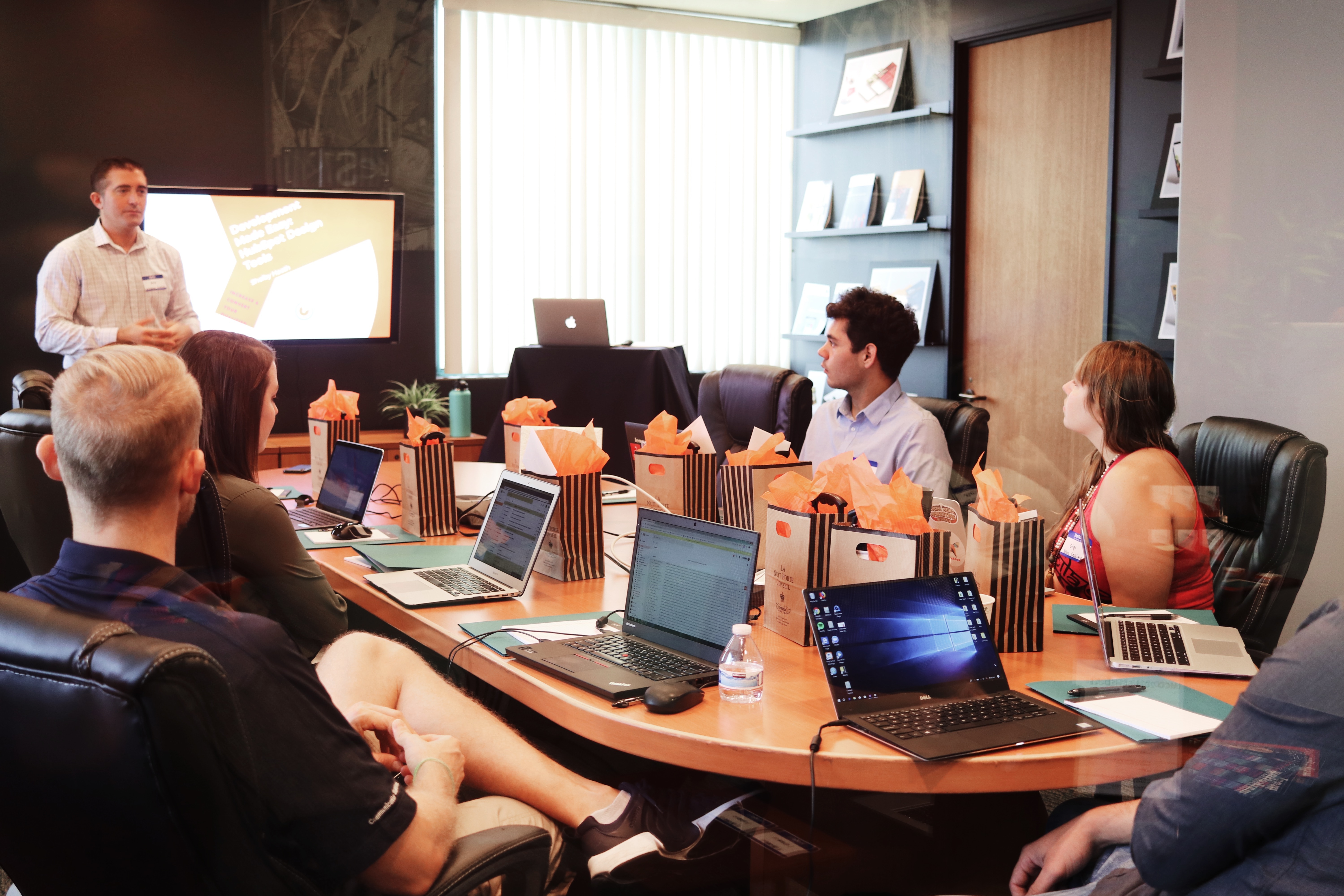Templeton & Partners presents Let's Talk Tech, a series of interviews aimed at tech professionals, regardless of where they stand in their careers. Experts in different IT roles share their career journeys, industry insights, career advice, and tips on becoming successful in your field.
Project management is a complex and dynamic field that requires a diverse range of skills and expertise.
To gain insights into the world of project management, we interviewed Jan Willem van Borren, an ICT professional with over 25 years of experience in the industry based in the Netherlands. Jan Willem has worked for some of the biggest names in business consultancy, including PricewaterhouseCoopers, IBM, Accenture, and T-systems. Over the years, he has held multiple project management and functional roles, leading international and diverse teams in digital transformation.

In this interview, Jan Willem shares valuable tips on staying relevant in your field, delves into the qualities that make a successful project manager, and the transformative impact of emerging trends on the world of work and job roles, shares lessons learned from his personal journey, and his experience working with intercultural teams.
You have many years of experience in the field and have managed to build quite an impressive resume over time. Tell us a bit about yourself and your career path so far.
During my secondary school years, I discovered a genuine passion for coding, but I also enjoyed subjects like mathematics, physics, and chemistry. When I was about to enter university, the IT market was experiencing a downturn while Chemistry and Biochemistry were booming. Although I was intrigued by Computer Sciences, this shift in demand led me to pursue molecular sciences and Bioprocess technology studies instead at Wageningen University. But what is meant for you is going to catch you eventually.
During my master’s degree, I found myself participating in a research programme at the University of California Davis. It was a great time and place to be as a 24-year-old, but it was also when I started questioning whether that was something I wanted to do for the rest of my life, working for days and days on the same project. And the answer was clear: it wasn't my calling. Nevertheless, having invested six years in university education, I completed my studies and spent a couple of years working at a nearby research institute.
After that, I joined an IT company, TAS Informatica, and worked as a first assignment for Equens, which set financial payments between Dutch and foreign banks. In the meantime, during the late nineties, I was also exploring the options of internet technology with some colleagues after business hours. We devoted our time to developing internet sites and received funding support from our company. In the years after, web technology was part of many of my projects. This investment in new knowledge has put me in a position to accept a job at PriceWaterhouseCoopers Consultancy as a consultant in e-commerce and internet technology in the year 2000.
My time at PwC was an amazing period where I had the pleasure of working alongside many young, intelligent, and ambitious individuals and the opportunity to work on quite some interesting projects. One of them was to set up an omnichannel strategy for a traditional insurance company. The consulting part had to be separated from the accounting part of the business by regulatory requirements from Washington and Brussels, and all the big four consultancy companies had to split. The consulting division was acquired by IBM, and I found myself transitioning to a new professional landscape.
Almost immediately after university, you found yourself working in IT and consulting, and it sounds like you had to learn a lot of technical skills on the job. How did you manage to handle all the work required, and how did your background help you?
To be honest, my educational background didn’t help me much. I had to learn everything hands-on. In my first job, I had to sign a contract to stay for a few years, during which I received education and training in IT. I also took online classes for computer programming and attended courses from Open University and Delft University of Technology in the evenings and on weekends. In the beginning, I was assigned simple tasks at work, and although I didn't enjoy doing the simple work, I knew that it was necessary to build my skills to work on more challenging projects. It was a lot of hard work, but I was motivated to learn and grow in my career.

Discover the ins and outs of living and working in the Netherlands - The Ultimate Guide
When did you make the transition to project management?
During my time at IBM, I was involved in their offshoring activities. We strategically retained a few key competencies in the Netherlands and Europe, while shifting the majority of operations to India and China, with a particular focus on India. As this shift took place, I found myself gradually moving away from purely technical work and taking on roles such as Team Lead and Lead Developer. When IBM signalled that programming work and technical work would be shifting to India, it was an accelerator for me to consider pursuing project management roles.
It wasn’t a clear-cut transition; it happened progressively over time. I started as a programmer, then a team lead, and so on. In the meantime, I knew I had to take advantage of as many learning and training opportunities as I could. I took up free courses on IBM project management procurement claims, and PwC also offered me courses in this area. So, it was not a straightforward path but rather a blend of hands-on experience and targeted training to gradually progress into project management.
What are the qualities, skills and attributes that make a good project manager?
Being an effective project manager involves several key qualities and approaches. First and foremost, being a good listener is crucial. By actively listening to team members and stakeholders, you create an environment where everyone's perspectives and ideas are valued. Acknowledging and giving your team members credit for their contributions is also vital. You need to empower your team and allow them to shine by providing them with the necessary support and recognition. And while it’s great to have self-confidence, it's equally important to remain humble and approachable. This is how you built trust.
Undoubtedly, there will be occasions where you encounter resistance and have to manage individuals who are unwilling to collaborate. But as a project manager, you always need to understand why and find ways to work around it. It's about bringing everyone to the table, understanding their interests and finding common ground.
At times, being able to think outside the box is also necessary for overcoming obstacles and achieving project success. Even when your company's or industry's rules and procedures are quite strict, there's always room for innovative problem-solving approaches. As a good project manager, you need to think creatively and approach challenges with flexibility while respecting the boundaries of established guidelines.

Discover more from our Let's Talk Tech Series: Interview with a Project Manager
In your years of experience, you have managed many diverse teams. Can you recall a particularly challenging project or team member you had to deal with, and how did you handle the situation?
Throughout my career, I've had the pleasure of leading diverse teams from all over the world. One project that comes to mind is when I worked for a small energy company that was founded by refugees from Vietnam, with team members from Brazil, Iran, Indonesia, Kenya, and all around the world. The level of diversity was truly remarkable, and it was a lot of fun. Despite our differences, we all shared a common mindset. We recognised that, fundamentally, we are all humans who want and deserve the same things, like being acknowledged for our work and having a safe and inclusive workplace.
Now, turning to your question about challenges, I faced an interesting situation while working at Tata Steel. The Dutch are known for being direct, but other cultures can see this as too blunt. So, when this company was bought by Indian investors, which are known to be way more formal, I often caught myself thinking, “Oh my god, you can't say that! It might offend someone." It's quite Dutch to have an opinion about everything, but this is not always the right thing to do when working in multicultural environments.
When you’re dealing with people from different backgrounds, you need to be aware of cultural differences and adopt a mindset of understanding and compromise. This includes adjusting your communication style accordingly and genuinely seeking to understand what’s right for your team and how you can support their career aspirations. By considering their individual needs and preferences, you’re supporting their professional growth and creating a more fulfilling work experience. And they will appreciate your investment in their success.
Ultimately, it boils down to understanding people on a personal level, respecting their cultural (or otherwise) differences, and being receptive to the unique needs of each individual.
How do you stay up to date with the latest trends and developments in your field, considering the constant emergence of new technologies and methodologies?
Staying current in my field is a top priority for me. Despite the demands of my personal life, with a busy schedule and family commitments, as a contractor, I recognise the need to invest in my skills and expertise. And while maximising my earnings is tempting, I understand that allocating time to stay informed about the latest advancements and keep pace with evolving technologies is essential for my professional development.
So I try my best to balance everything out and make sure I have time to read relevant literature, industry publications, and online resources. Taking courses and connecting with professionals in my industry are also important. Now, I’m attending seminars on data lakes and how to extract relevant management data from big data and transform this into dashboards. This trend is ongoing, and I expect this only to speed up over the following years.
In my project management roles, I also actively assess the deliverables produced by my team. This process allows me to stay updated on the progress and quality of work, ensuring alignment with the latest industry standards. By reviewing documents, collaborating with architects, and seeking feedback from stakeholders, I gain valuable knowledge about industry practices, such as digital twins and other emerging trends.

Are there any aspects of being a project manager that are often overlooked or not fully understood? What are the biggest misconceptions about the role?
Being a project manager, it’s not really about making things happen; it’s about creating the environment and providing the necessary guidance, structures and support that will allow your team members to shine and perform at their best. So, as a project manager, you’re not the one actually doing the work. You serve as a facilitator. Your primary responsibility is to enable your team to execute their tasks effectively by ensuring they have the resources, safety, and conditions needed to succeed. Additionally, it’s your responsibility to shield them from unnecessary politics and distractions so that they can focus on their job.
Another misconception about project management is that the role is solely focused on task management. In reality, successful project management requires a deep understanding of the project itself. It is crucial to comprehend the objectives, scope, and timelines involved to provide meaningful answers and guidance. Without this understanding, it becomes challenging to make informed decisions, set realistic expectations or evaluate a project’s quality.
What have you learnt from your past mistakes? Is there any particular approach that you no longer use as a project manager?
Certainly, as I reflect on my journey as a project manager, there was a time when I used to assume excessive responsibility for the success of a project. I made some beginner's mistakes, and the consequence was feeling squeezed and overwhelmed. Whenever collaboration was lacking or conflicting interests arose, I would unintentionally become the sole owner of the problem. People would look to me for answers and direction, questioning why things weren't progressing as expected.
Over time, I realised the importance of ensuring that responsibilities remain with the individuals who are accountable for specific tasks. Instead of shouldering the entire burden, I shifted my approach to bringing responsible parties to the table. By facilitating discussions and encouraging shared decision-making, we could collectively address challenges and decide the best course of action.
Recognising that successful project delivery is a collective effort was the most significant lesson I learnt on the job. Distributing responsibility and engaging stakeholders in decision-making processes helped me achieve better alignment and reduced risks on project outcomes.

AI tools are rapidly transforming the way we work across sectors. Especially ChatGPT has become a buzzword all around the world. How does this technological advancement impact your daily work? Do you believe it brings more benefits or poses threats?
I'm genuinely fascinated by the latest AI tools, and in my free time, I explore and experiment with them a bit. I've already incorporated ChatGPT into my work routine, particularly for generating standard emails, and it has proven to be a significant time-saver. I always double-check the responses, however, as it can occasionally make errors.
From my perspective, AI has the potential to reshape our world in ways we can’t even imagine. For instance, in the IT industry, tools like ChatGPT can generate source code. This means that software development can shift towards a higher-level architectural approach, where you define the structure of your business processes. You can provide the AI with software components, input and output parameters, and it will generate and debug the code accordingly. In the past, writing code manually line by line was the norm, but with AI, automation can handle much of the repetitive work, freeing up time for the more important stuff.
Personally, I have even experimented with asking ChatGPT to generate an Android phone app for me, and to my surprise, it actually created one on the fly. It even included an instruction manual for setting it up on different devices and environments. The possibilities are truly impressive, and it highlights the potential for AI to automate tasks and streamline workflows.
Workwise, at Shell, we’re now exploring the application of AI in analysing maintenance data. We're particularly interested in using AI algorithms to interpret signals from various sensors, such as vibration and heat sensors, to assess the quality of equipment like pumps and ventilators. The goal is to leverage AI to predict potential breakdowns or optimise production, as this can lead to significant cost savings. For instance, we are considering condition-based maintenance in the petrochemical industry and determining the appropriate window for maintenance based on sensor signals indicating the need for part replacements. Additionally, we are exploring the possibility of utilising AI to analyse vast amounts of data from chemical plants, searching for patterns and insights that could enhance operations.

Undoubtedly, technology has made our lives easier in countless ways. However, some professionals, particularly those in the tech and IT fields, may view advanced AI tools like ChatGPT as a potential threat to the future of their roles. Do you share the same concerns?
AI tools have the potential to impact the way we work, and inevitably, the nature of many jobs will undergo significant changes, and the relevance of some skills (such as Photoshop and website building) may even diminish over time. These are reasonable concerns that we, as professionals, need to address and adapt to.
In the past, a significant amount of effort was dedicated to coding and handling low-level tasks. Now, labour-intensive tasks can and will be automated. However, understanding the business framework and processes or setting up the overall landscape will continue to require the human touch. Personally, I see this as an opportunity to shift our focus from the nitty-gritty technical work to the more consultative, creative and strategic aspects of our roles.
What factors influenced your decision to pursue a career as a contractor, and what advantages do you find in this type of work arrangement? Were there any drawbacks in your experience?
When I was working for consulting firms, I often had little say in the projects I was assigned to, regardless of whether they aligned with my career goals or involved extensive travel. Now, as a contractor, I have the freedom to choose my own assignments and negotiate my own terms and fees directly. This level of autonomy also allows me to take a course or dive into a new technology without asking for permission or having to take time off. I’m my own boss. And, of course, being a contractor can also be more rewarding financially.
On the other hand, you don’t have that sense of security and continuity or the steady income that a full-time job can offer you. Many employees don’t realise how many things are being taken care of for them, such as pension schemes and insurance coverage. As a contractor, all these responsibilities fall on you, which can be quite expensive and time-consuming. There are always two sides to a coin.
Contractor of Employee? Contractor vs Freelancer vs Full-Time Employee: Pros and Cons
What final advice or words of wisdom would you like to share with aspiring individuals considering a career in project management?
I believe this advice applies to everyone, regardless of their chosen career path. While it's essential to follow your heart and pursue your passions, it's equally important to do that with a rational mindset. To give yourself the best possible chance to achieve any goal, you need a clear mind and a structured approach.
Every job has its challenging days. But, if you find no joy in what you do, every day is going to feel like a Monday. So, take the time to discover your passion and craft a well-thought-out plan to make it your profession. That’s the only path that can lead to long-term satisfaction in your professional journey.
A big thank you to Jan Willem for sharing his insights and inspiring career journey with us.

Find Your Next Career Opportunity
Looking for a new role?
We provide contract tech jobs in 40 countries worldwide, and our diverse, international team is on a mission to find the right one for you. Search hundreds of open IT job vacancies here or get in touch with us today!
You can count on us to keep you updated about the latest news and career opportunities in tech and IT. Just follow us on LinkedIn.
Discover How to Become an IT Project Manager – A Complete Guide for 2023




